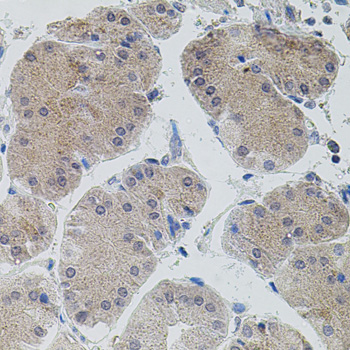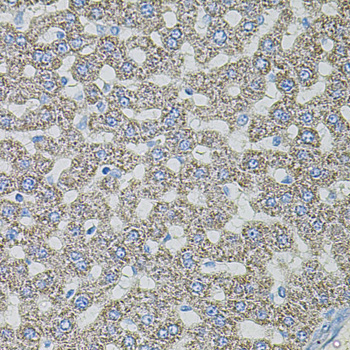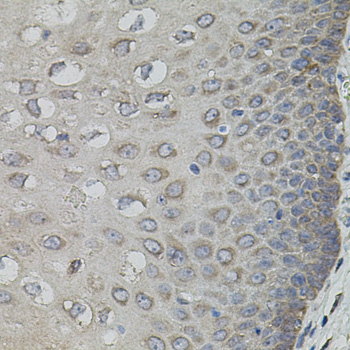-
Product Name
ASK1 Polyclonal Antibody
- Documents
-
Description
Polyclonal antibody to ASK1
-
Tested applications
IHC
-
Species reactivity
Human, Rat
-
Alternative names
MAP3K5 antibody; ASK1 antibody; MAPKKK5 antibody; MEKK5 antibody; mitogen-activated protein kinase kinase kinase 5 antibody
-
Isotype
Rabbit IgG
-
Preparation
Antigen: Recombinant fusion protein containing a sequence corresponding to amino acids 1173-1374 of human ASK1 (NP_005914.1).
-
Clonality
Polyclonal
-
Formulation
PBS with 0.02% sodium azide, 50% glycerol, pH7.3.
-
Storage instructions
Store at -20℃. Avoid freeze / thaw cycles.
-
Applications
IHC 1:50 - 1:200
-
Validations

Immunohistochemistry - ASK1 Polyclonal Antibody
Immunohistochemistry of paraffin-embedded human stomach using MAP3K5 antibody (40x lens).

Immunohistochemistry - ASK1 Polyclonal Antibody
Immunohistochemistry of paraffin-embedded rat liver using MAP3K5 antibody (40x lens).

Immunohistochemistry - ASK1 Polyclonal Antibody
Immunohistochemistry of paraffin-embedded human esophagus using MAP3K5 antibody (40x lens).
-
Background
Serine/threonine kinase which acts as an essential component of the MAP kinase signal transduction pathway. Plays an important role in the cascades of cellular responses evoked by changes in the environment. Mediates signaling for determination of cell fate such as differentiation and survival. Plays a crucial role in the apoptosis signal transduction pathway through mitochondria-dependent caspase activation. MAP3K5/ASK1 is required for the innate immune response, which is essential for host defense against a wide range of pathogens. Mediates signal transduction of various stressors like oxidative stress as well as by receptor-mediated inflammatory signals, such as the tumor necrosis factor (TNF) or lipopolysaccharide (LPS). Once activated, acts as an upstream activator of the MKK/JNK signal transduction cascade and the p38 MAPK signal transduction cascade through the phosphorylation and activation of several MAP kinase kinases like MAP2K4/SEK1, MAP2K3/MKK3, MAP2K6/MKK6 and MAP2K7/MKK7. These MAP2Ks in turn activate p38 MAPKs and c-jun N-terminal kinases (JNKs). Both p38 MAPK and JNKs control the transcription factors activator protein-1 (AP-1).
Related Products / Services
Please note: All products are "FOR RESEARCH USE ONLY AND ARE NOT INTENDED FOR DIAGNOSTIC OR THERAPEUTIC USE"
